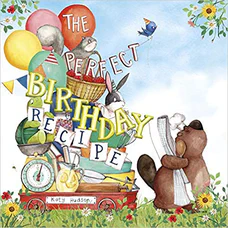The Perfect Birthday Recipe

Recommended Age Range: Preschool through 2nd grade
Publisher's Summary:
This year Tortoise, Bird, Rabbit, and Squirrel insist on baking Beaver’s birthday cake, but Beaver isn’t so sure. He is the ultimate perfectionist and would rather do it himself, following the recipe exactly. Will Beaver’s nitpicky ways ruin his birthday and his friendships?

Dr. Annie's Takeaways
Recommended for: For a child struggling with perfectionism in the context of group projects or collaborative activities with friends (perhaps they are getting mad at other kids for not doing things “right,” or maybe they feel like they always need to be in charge), this book is both validating and thought-provoking. It aligns itself with a perfectionistic child and presents the possibility that sometimes letting things be less-than-perfect ultimately results in a more perfect experience: “The decorations were wonky…and the cake was stale…It was not at all what Beaver had planned, but it was the best birthday he ever had. It was, in fact, perfect.”
Would a child like it? Many children would enjoy this book. It’s pretty funny–Beaver’s friends make all kinds of silly mistakes, and the cake turns out disgusting (there are worms in it). It’s also quite poignant and challenges children to consider a socially complex idea.
Evidence-Based Practices:
Cognitive Restructuring
Tone: Upbeat, a bit funny, empathetic
Story Quality: This story really aligns with a child who is perfectionistic and frustrated by others who are less so. The reader empathizes with Beaver, and we feel his frustration when, despite their good intentions, his friends totally botch his birthday cake plan. There’s a bit of subtlety to the ultimate message of the book–that sometimes there’s a social cost to perfectionism, and it’s often better to accept your friends’ imperfections. Many books on perfectionism lightly make fun of the perfectionist (none on my list, though!), and this book really doesn’t do that. If anything, it’s making fun of everyone else’s messiness while reassuring a child that sometimes it’s worth coping with this messiness and possible to do so.
Illustrations: Very cute, colorful watercolor illustrations with a lot of fun details to look at.
Representation: Beaver is a male gasp beaver. He has friends who are different animals (Bird, Tortoise, Squirrel, and Rabbit). The animals use he/him and she/her pronouns, but they are otherwise ungendered. They live in a nature-y area with a lot of aspects of the human world (e.g., mixers and red wagons and birthday cakes).
Psychological Practices: This book helps children to consider the social cost of perfectionism–when it’s worth holding everyone to a child’s own standards (which is perhaps often a fruitless mission with inevitable frustration) and when it’s better to relax and enjoy a less-than-perfect experience that is more social and fun. When Beaver’s friends take over his birthday cake-making, their cake is melty, poorly mixed, and filled with worms. He snaps: “That is the ugliest, most disgusting cake I have ever seen!” It’s definitely worse than his perfect rendition. He stays up late that night making a new one by himself, but then he realizes (in a heartbreaking two-page spread that really illustrates the loneliness of perfectionism) that having a perfect cake and being alone is worse than being with friends and having a less-than-perfect cake. He is ultimately able to enjoy his birthday despite its imperfections. I wish the story included a nod to how Beaver makes peace with his imperfect cake (his thoughts, etc.) but it presents the idea that this is possible, which is still useful.
Concerns: None.
